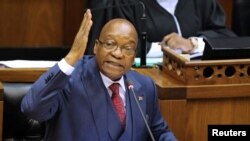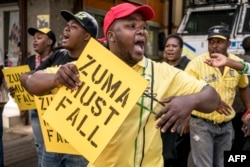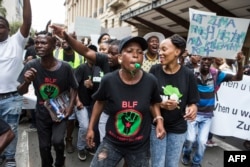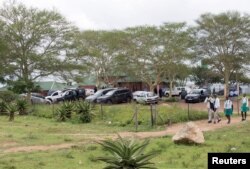South Africa's ruling African National Congress on Monday called a special meeting of its decision-making executives for later in the week as pressure grew on veteran President Jacob Zuma to step down after years of scandal.
Senior officials of the ANC met to discuss the 75-year-old leader's future, which is in the balance over long-running corruption allegations and a weakened economy even as prominent allies desert him.
They include Cyril Ramaphosa, the deputy president, who replaced him as ANC leader in December and who is now lobbying behind the scenes for him to step down as head of state too.
When the meeting of senior party officials broke up Monday, ANC spokeswoman Khusela Diko dodged a question on what discussion there had been of Zuma, in power since 2009, being removed from office.
"There is no item on an ANC agenda which says the recall [removal] of President Zuma," she said.
But the ANC said the National Executive Committee (NEC), which handles key party decisions, would meet Wednesday to discuss preparations for the State of the Nation address Thursday, among other issues.
Zuma is scheduled to deliver the speech to parliament Thursday, though opposition parties and some in the ANC want Zuma to go before that.
The NEC, which has run South Africa since the end of white minority rule in 1994, has the power to force Zuma to quit.
The ANC's top six most powerful officials met Zuma late Sunday at his official residence in Pretoria, but there was no announcement of the outcome.
Analysts said then that senior party officials had failed to persuade Zuma to quit.
A group of Zuma loyalists marched Monday on the party's headquarters in downtown Johannesburg, Luthuli House, in support of the president and two senior ANC sources said it was not certain the NEC would vote Wednesday to remove him as president.
"It will depend on the balance of arguments in the room. The meeting today was called to arrange the NEC. We will discuss Zuma's recall [removal], but it's not clear whether we will arrive at a decision," one of the sources said.
The rand, which has tended to strengthen on signs that Zuma could step down before his second term as president ends next year, was slightly firmer Monday.
Zuma's tumultuous time in power has been marked by a string of corruption allegations and street protests against his rule, though he has managed to survive several no-confidence votes.
Scandals include 783 counts of corruption which he is still fighting over a 30 billion rand (now $2.5 billion) government arms deal arranged in the late 1990s when he was deputy president.
Zuma weathered a no-confidence vote in parliament after an anti-corruption watchdog investigation found he had "unduly" benefited from renovations at his home and paid back more than $500,000 after unsuccessfully trying to argue his case in the Constitutional Court.
Zuma meets Zulu king
Zuma met Zulu King Goodwill Zwelithini on Monday at the king's residence in Ulundi in the Kwa-Zulu Natal province, said Prince Thulani Zulu, a spokesman for the Zulu royal household.
The spokesman declined to speculate on whether the king, a key ally of Zuma, who is also a Zulu, would add his voice to those urging the president to step down. It was not clear when the meeting would end.
Zuma's spokesman Bongani Ngqulunga said the meeting with Zwelithini was "a longstanding courtesy meeting between the President and His Majesty which was initially meant to take place in January but was postponed due to diary challenges on both sides."
Zwelithini is the influential traditional head of South Africa's biggest ethnic group, with around 10 million first-language Zulu speakers out of a total population of around 55 million, but he holds no role in government.
"Zuma would listen to the Zulu king. Zuma is a traditionalist and has a power base in KwaZulu-Natal province," said political analyst Ralph Mathekga. "The king is a bargainer, he could help Cyril [Ramaphosa] heal KwaZulu-Natal after Zuma goes."
Zuma has not said in public whether he will step down voluntarily. However, he faces a new no-confidence vote in parliament against his leadership on Feb. 22, filed by the opposition far-left Economic Freedom Fighters party (EFF).








